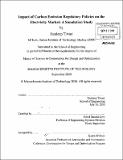Impact of carbon emission regulatory policies on the electricity market : a simulation study
Author(s)
Tiwari, Sandeep, S.M. Massachusetts Institute of Technology
DownloadFull printable version (6.297Mb)
Other Contributors
Massachusetts Institute of Technology. Computation for Design and Optimization Program.
Advisor
David Simchi-Levi.
Terms of use
Metadata
Show full item recordAbstract
With ever rising concerns regarding global warming and other dangerous effects of CO2 , there had been efforts to reduce CO2 emissions all around the world by adopting more efficient technologies and alternate green or carbon neutral fuels. However, these technologies require large investments and hence to make them economically viable there should be suitable incentives from the government in form of emission regulatory policies such as carbon taxation and carbon cap-and-trade policy. In this research, a simulation study was carried out to analyze the impact of different carbon emission regulatory policies including cap-and-trade policy and carbon taxation policy on the utilities of various stakeholders of the electricity market. An agent based simulation approach was used to model the market where each market stakeholder was represented as an autonomous agent. We use the simulation model to compare the effectiveness of cap-and-trade policy and taxation policy in achieving emission reduction targets. We observe significant windfall profit for electricity producers under the cap-and-trade policy. Therefore for the same emission level the cost to consumers is higher under cap-and-trade policy as compared to taxation policy. Our results suggest that cap-and-trade policy might be ineffective in emission reduction when the market is not fully efficient. Moreover the simplicity of Taxation model gives government a better control on emissions. Based on our study we recommend that the present model be extended to more efficient cap and trade mechanisms by incorporating multistage periods, auctioning of carbon emission permits and carbon emission permits banking.
Description
Thesis (S.M.)--Massachusetts Institute of Technology, Computation for Design and Optimization Program, 2010. Cataloged from PDF version of thesis. Includes bibliographical references (p. 119-121).
Date issued
2010Department
Massachusetts Institute of Technology. Computation for Design and Optimization ProgramPublisher
Massachusetts Institute of Technology
Keywords
Computation for Design and Optimization Program.